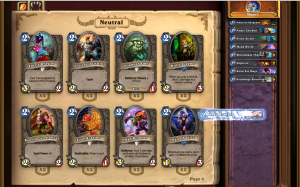Gods Will Be Watching is turning out to be a very polarizing game, with many reviewers (including me) marking it down heavily for brutal difficulty and very rigid design while others are praising it. The game is the latest example in a form of design that I’m just not a fan of and what I’ve dubbed mechanical gameplay.
Following Instructions:
When it comes to gameplay and game design, one of the major tenets would be that the player has to interact with the game. Responsive gameplay is about the player constantly reacting to what’s going on and being engaged by the title and is something that I personally like. Whether it’s having to examine the right move to make during a strategy game or getting into a fight in a first person shooter.
But the antithesis of responsive gameplay where input and engagement are removed in favor of following a specific order it’s what I’ve coined as mechanical gameplay.
Mechanical Gameplay: Games that are designed to function the same way every time and reduces the gameplay down to a specific set of instructions.
For those who are old enough to remember it, cut scene driven games like Dragon’s Lair and Space Ace were the original examples of mechanical gameplay. Every play requires the same inputs at the same time with no exception. Keeping with the name, you could pretty much design a computer algorithm to play the game itself as there is no thought needed to play them.
Now you may wondering why I’m talking about mechanical gameplay today as titles like Dragon’s Lair now only exist in the past. However, mechanical game design can come in other forms and play styles.
The Return of the Chick Parabola:
Today mechanical game design can exist when we talk about master level skill at any game. Once the player figures out all the ins and outs of a game, it can become very repetitive and robotic to play it. This goes back to the phrase: the Chick Parabola, where game journalist Tom Chick talked about how his engagement playing strategy titles decreased the more he mastered the rules.

Good strategy game design is about presenting a variety of options for the player and preventing the game from playing out the same way every time.
Again, if you know that a specific strategy works every time without fail, then it becomes easy to set up a predefined way to play the game that could be followed by a machine.
This to me is when a game is done as I don’t like to play games where everything is predefined from the word go.
But what’s interesting about mechanical gameplay is that there is one area where it is not only preferred but required and that is competitive games.
Breaking Games Down:
Watching any tournament level play, you can see that the best players have the mechanics mastered by breaking the game down to its tiniest details. For instance in fighting games, someone would know the exact range of attacks, what attacks to use when and more.
The point is that to play competitively, does require the player to become somewhat mechanical in their approach. Watching high level Starcraft 2 play, it’s not about playing the game in the sense that you are fighting someone but you are going through your build order at the same time someone is going through theirs.
This is why I’m not a fan of watching strategy games played professionally due to that feeling that most of the actual play was done on figuring out the build order. But fighting games avoid this as you can’t ignore the person next to you and there is a whole lot that goes into reading the opponent, figuring out their preferred combos and changing your gameplay to match.
While competitive play is where mechanical game design shines, I’m still not a fan of playing it and I have two examples that are very different from each other that I’ve been trying to get into.
Following a Guide:
Gods will be Watching and Hearthstone don’t sound all that similar to each other: One is a puzzle/mini game focused adventure game while the other is a F2P CCG. Yet both titles are guilty of mechanical gameplay and why I’m having a lot of trouble getting into them.
Gods Will Be Watching I talked about in my analysis of it, but the short story is that the game requires you to perform a specific set of actions in each chapter while dealing with a random factor that can screw you up. There’s no sense of really learning the game and neither do your skills translate from one chapter to the next as each one has different rules.
If I wanted to, I could spend the next week or so going through each chapter figuring out the exact pattern and hopefully avoiding the random chance at failure, but I wouldn’t have grown as a gamer from it. All I would have done was figure out the right set of instructions I was given.
With Hearthstone, it runs into a similar problem that competitive games like Starcraft have: That the actual playing of the game is reduced down to a series of optimal choices. The majority of the actual “gameplay” is deck creation, but there just aren’t enough rules and mechanics to devise a wide variety of viable decks from. So instead we have each class having several “correct” builds and then the rest of the game is just hoping that you get the cards you need.

Hearthstone’s problem is that without a variety of viable cards, it restricts optimal play down to only a few options.
And what’s frustrating me to play it is that I know I have two choices in playing Hearthstone. I can either spend the next few months slowly building up cards and messing around with characters until I have decks that I like and that work.
Or I could spend ten minutes on Google, find professional decks and then just use my credit card to get something that could take me into the top ranks of season play.
Mechanical Game Design is something in my opinion that should be avoided by the designer. While competitive level games do reach that point, the game shouldn’t be designed initially in this manner as it leaves games feeling more like work than anything else. Where there is no sense of growth, just simply following the pattern and playing the most elaborate version of Simon Says ever.



